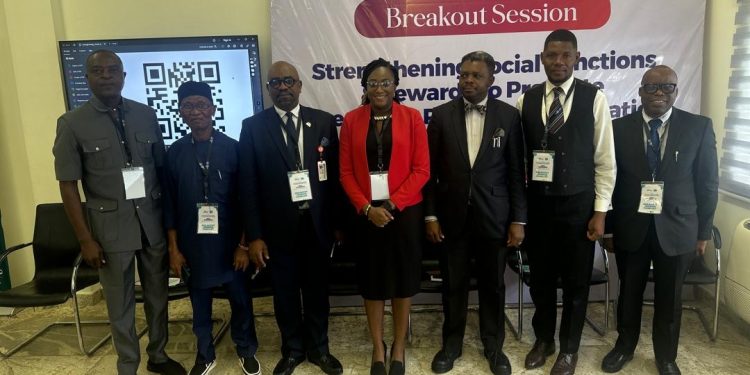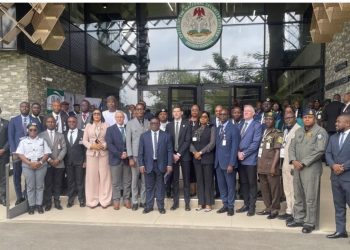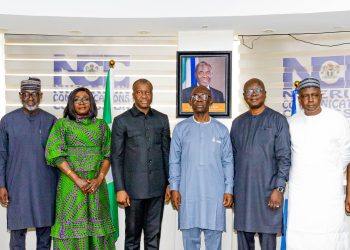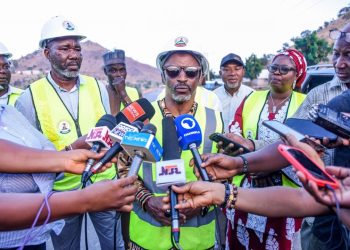By Nkechi Eze
The Independent Corrupt Practices and Other Related Offences Commission (ICPC) has reiterated its unwavering commitment to strengthening accountability, advancing criminal justice reforms, and promoting value reorientation among Nigerian youths as part of efforts to build a transparent and just society.
The Commission made this known during the Nigeria Accountability Summit (NAS) 2025, held in Abuja, with the theme “Strengthening Accountability for Inclusive Economic Growth.” The summit was jointly organised by Step Up Nigeria, Accountability Lab, and the United Nations Office on Drugs and Crime (UNODC).
According to a statement signed by the ICPC Director of Public Enlightenment and Spokesperson, Demola Bakare, the reaffirmation was delivered by the Chairman of the Commission, Dr. Musa Adamu Aliyu, SAN, who was represented by Mr. John Okor Odey, Deputy Director and Head, Education Division, Public Enlightenment and Education Department.
Mr. Odey, who served as a panelist during the session themed “Strengthening Social Sanctions to Promote Integrity in Public Administration for Inclusive Growth,” stressed that accountability remains the foundation of sustainable national development. He noted that an effective and fast-tracked criminal justice system is essential for building public confidence in the fight against corruption.
He explained that a transparent, fair, and efficient justice process not only deters corruption but also ensures equality before the law and restores public trust in governance. “Accountability is the bedrock of sustainable growth, and justice reform is indispensable in strengthening the rule of law and public confidence,” Odey stated.
Highlighting ICPC’s ongoing initiatives, Odey outlined the Commission’s efforts in strengthening institutional integrity within the public sector through inter-agency collaboration, system reviews, and policy advocacy aimed at promoting efficiency and fairness in public administration and service delivery. He stressed that the anti-corruption war must go hand in hand with reforms in law enforcement, investigation, prosecution, and community engagement to achieve lasting results.
Addressing the issue of value reorientation, Odey emphasized the Commission’s focus on youth engagement and moral education, particularly through the establishment of Students Anti-Corruption Clubs and the Students Anti-Corruption Vanguard across primary, secondary, and tertiary institutions nationwide. He noted that cultivating a culture of integrity among young Nigerians is crucial to grooming a future generation of accountable leaders.
He commended the organisers and implementing partners of NAS 2025 for providing a platform that fosters collaboration and innovation in governance, adding that such initiatives align with ICPC’s preventive mandate to promote transparency, ethical conduct, and good governance in the public sector.
Odey also clarified that the ICPC operates with full independence, noting that there has been no evidence or record of government interference in its operations. He called for stronger partnerships among anti-corruption agencies, the judiciary, civil society organisations, and the private sector to strengthen accountability systems and foster inclusive national development.
Other panelists at the session included Mr. Atolagbe Aramide of the Code of Conduct Bureau, Barr. Anthony Bamidele Ojo, Chairman of the NBA Garki Branch, Dr. Femi Ajayi of UNODC, Mr. Jonathan Otene, a teacher at BJ Schools, and Mr. Ezegbuam Philip, an Integrity Icon awardee. The discussion was moderated by Ms. Feranmi Iyanda, Director of Programmes at Step Up Nigeria.
The session featured robust deliberations on bridging the gap in enforcing social sanctions, promoting ethical leadership, and strengthening integrity systems to drive inclusive growth.
The 2025 Nigeria Accountability Summit concluded with renewed commitments from government institutions, civil society, and development partners to deepen transparency, uphold justice, and consolidate ongoing reforms for sustainable national progress.
The annual summit serves as a premier platform for engaging stakeholders from the public and private sectors, civil society, and international development partners to review governance reforms and develop innovative strategies for promoting accountability and inclusive economic growth in Nigeria.
















